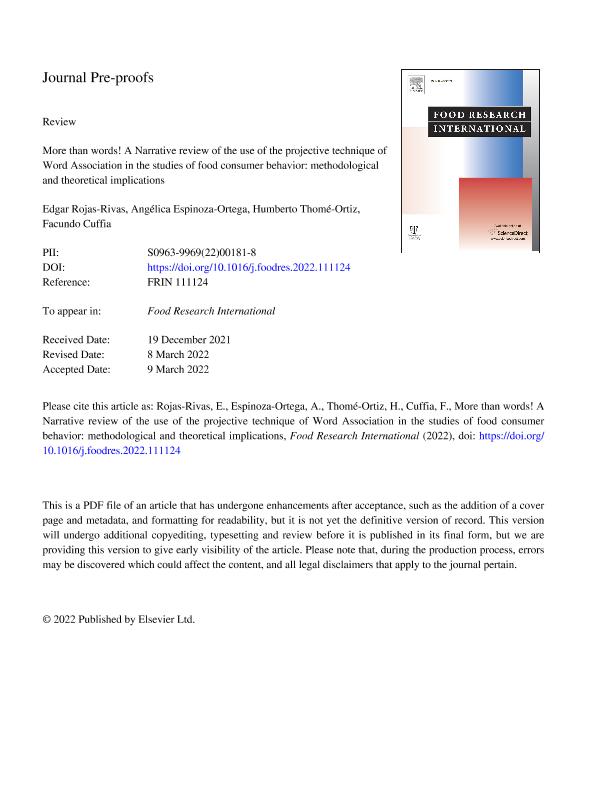Mostrar el registro sencillo del ítem
dc.contributor.author
Rivas Rojas, Edgard Alejandro

dc.contributor.author
Espinoza Ortega, Angélica
dc.contributor.author
Thomé Ortiz, Humberto
dc.contributor.author
Cuffia, Facundo

dc.date.available
2022-07-05T17:18:03Z
dc.date.issued
2022-06
dc.identifier.citation
Rivas Rojas, Edgard Alejandro; Espinoza Ortega, Angélica; Thomé Ortiz, Humberto; Cuffia, Facundo; More than words! A narrative review of the use of the projective technique of word association in the studies of food consumer behavior: Methodological and theoretical implications; Elsevier Science; Food Research International; 156; 6-2022; 1-23
dc.identifier.issn
0963-9969
dc.identifier.uri
http://hdl.handle.net/11336/161318
dc.description.abstract
Word association (WA) is a projective and powerful technique that consists of the spontaneous generation of words from specific stimuli. This technique is used in sociology and psychology studies; however, in the Consumer and Food Science area has gained importance since it allows to explore beliefs, expectations, or attitudes in the context of food consumption behavior. The aim of this work is to present a current status on the use of this technique in the studies of food consumption behavior. A narrative review of the literature was carried out with articles published in four databases: ScienceDirect, Wiley Online Library, Emerald Insight, and Taylor & Francis. Seventy-four articles that show the use of the WA technique in different cultures were selected. WA technique has been applied in different countries, however, it has been primarily used in Latin America. WA has been applied mainly to decipher consumers' perceptions towards different aspects of food, although some works show that WA serves to understand beliefs, expectations, impressions, attitudes, and even to conceptualize different categories of food from the language of consumers. Some theoretical and methodological implications are discussed regarding the use and application of this projective technique.
dc.format
application/pdf
dc.language.iso
eng
dc.publisher
Elsevier Science

dc.rights
info:eu-repo/semantics/openAccess
dc.rights.uri
https://creativecommons.org/licenses/by-nc-sa/2.5/ar/
dc.subject
FOOD CONSUMER BEHAVIOR
dc.subject
NARRATIVE REVIEW
dc.subject
PROJECTIVE TECHNIQUES
dc.subject
WORD ASSOCIATION
dc.subject.classification
Otras Ingenierías y Tecnologías

dc.subject.classification
Otras Ingenierías y Tecnologías

dc.subject.classification
INGENIERÍAS Y TECNOLOGÍAS

dc.title
More than words! A narrative review of the use of the projective technique of word association in the studies of food consumer behavior: Methodological and theoretical implications
dc.type
info:eu-repo/semantics/article
dc.type
info:ar-repo/semantics/artículo
dc.type
info:eu-repo/semantics/publishedVersion
dc.date.updated
2022-07-04T20:17:09Z
dc.journal.volume
156
dc.journal.pagination
1-23
dc.journal.pais
Países Bajos

dc.journal.ciudad
Amsterdam
dc.description.fil
Fil: Rivas Rojas, Edgard Alejandro. Universidad Autónoma del Estado de México; México
dc.description.fil
Fil: Espinoza Ortega, Angélica. Universidad Autónoma del Estado de México; México
dc.description.fil
Fil: Thomé Ortiz, Humberto. Universidad Autónoma del Estado de México; México
dc.description.fil
Fil: Cuffia, Facundo. Consejo Nacional de Investigaciones Científicas y Técnicas. Centro Científico Tecnológico Conicet - Santa Fe. Instituto de Lactología Industrial. Universidad Nacional del Litoral. Facultad de Ingeniería Química. Instituto de Lactología Industrial; Argentina
dc.journal.title
Food Research International

dc.relation.alternativeid
info:eu-repo/semantics/altIdentifier/url/https://linkinghub.elsevier.com/retrieve/pii/S0963996922001818
dc.relation.alternativeid
info:eu-repo/semantics/altIdentifier/doi/http://dx.doi.org/10.1016/j.foodres.2022.111124
Archivos asociados
